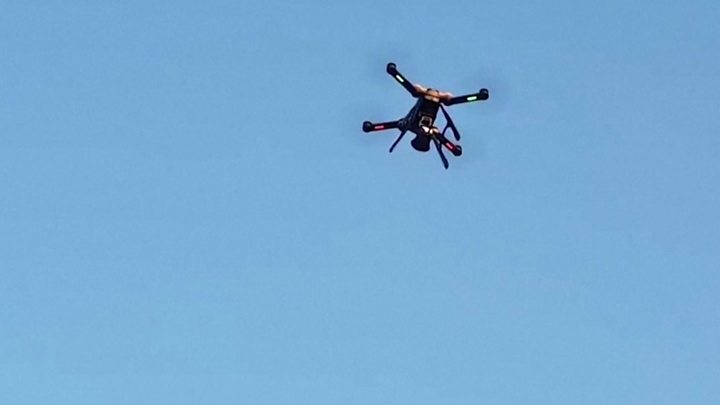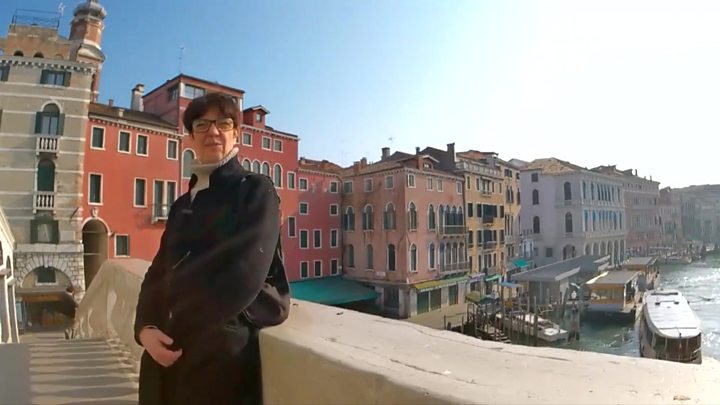Germany has announced stringent new measures to limit social contact, including the closure of most shops and entertainment venues, in an attempt to stem the spread of the coronavirus.
Religious services have been banned and people told to cancel any domestic or foreign holiday travel. Germany had already announced border closures.
France said people's movement would be limited and its borders closed.
Meanwhile, the UK prime minister has urged people to avoid pubs and clubs.
Boris Johnson said people should work from home where possible and refrain from non-essential travel or having contact with others, but did not announce any forced closures.
Earlier, the head of the World Health Organization (WHO), Dr Tedros Adhanom Ghebreyesus, said governments were not doing enough to combat the pandemic, and urged them to step up their testing programmes.
"You can't fight a fire blindfolded and we can't stop this pandemic if we don't know who is infected," he said at a news conference in Geneva. "We have a simple message for all countries: test, test, test."
There have been more than 174,000 confirmed cases of coronavirus globally and over 6,700 deaths, according to a tally from Johns Hopkins University.
What is Germany doing?
Speaking at a news conference in Berlin, Chancellor Angela Merkel announced that most non-grocery stores would close, along with clubs, bars, leisure facilities and playgrounds.
Restaurants will have to enforce a minimum distance between tables and work under restricted hours. Mrs Merkel, however, said the government would try to minimise the economic impact of the outbreak.
Germany now has close to 5,000 confirmed cases of coronavirus, and 12 deaths. Schools across the country were closed on Monday and large gatherings nationwide had already been banned.
Media playback is unsupported on your device
Traffic crossing Germany's borders with France, Austria, Switzerland and Luxembourg is now restricted to goods and people commuting for work. Only the borders with the Netherlands and Belgium are as yet unaffected.
Meanwhile, Foreign Minister Heiko Maas responded to reports that US President Donald Trump wanted to buy exclusive access to a potential vaccine developed by a German biotech firm, saying: "We cannot allow others to seek exclusive results."
What is France doing?
In a televised address, French President Emmanuel Macron ordered people to stay at home and only go out for essential duties. He said any infractions would be punished, adding: "We're in a health war".
Cafes, restaurants, cinemas and most shops are already shut. On Monday, the head of the country's health service, Jerome Salomon, said the outbreak was "very worrying" and "deteriorating very fast".
France so far has more than 5,000 infections and 127 deaths. The country would close its land borders from midday (11:00 GMT) on Tuesday, Mr Macron said.
How are other Europe countries responding?
Spain will start controls at land borders at midnight on Monday and only Spanish citizens, residents and special cases will be allowed in the country.
The Spanish government imposed a partial lockdown on its 47 million inhabitants on Saturday, as part of a 15-day state of emergency. People are barred from leaving home except buy essential supplies and medicines, or for work.

Media playback is unsupported on your device
Italy, the worst-affected nation outside China, where the virus originated, has more than 20,000 cases and has suffered more than 1,800 deaths.
Prime Minister Guiseppe Conte told the Corriere della Sera newspaper that damage from the virus would be "serious and widespread", adding: "After the coronavirus, nothing will be as before, we will have to sit down and rewrite the rules of trade and the free market".
Last week the WHO said Europe was now the "epicentre" of the virus and urged governments to act aggressively to control the spread of Covid-19, the disease caused by the coronavirus.
Dr Tedros also told other countries to follow the containment strategies used in China and South Korea, saying they showed the pandemic was controllable.

Media playback is unsupported on your device
In other European nations:
- Greece is shutting all shops, bars, chemists and petrol stations and putting all arrivals from abroad into quarantine for 14 days
- The Czech authorities sealed off an area in the east of the country – Unicov, Cervenka and Litovel
- Poland suspended all domestic flights, following similar moves on international air and rail travel
- Georgia banned all foreigners from entering the country
- Serbia declared a state of emergency
- Ukraine's capital Kyiv to shut restaurants, cafes and bars from Tuesday and restricted movement to other towns
- Poland, the Czech Republic and Denmark have already closed borders or introduced severe restrictions
On Monday, the European Commission has propRead More – Source



